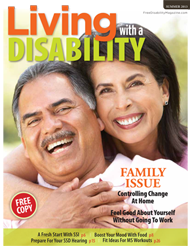If you, or someone in your family, live with a disability, it can be hard to find the support you need. You may feel alone, or that no one else understands what you’re going through. While family and friends can be good sounding boards, they can also lack a specific understanding of your unique situation. That’s where a support group comes in.
Support groups provide a friendly shoulder to people who share similar situations. They’re a place where you can meet with other people experiencing a similar disability – swap stories, share tips and form strategies for dealing with what life brings.
Choosing the right support group is vital, as certain groups will fit your needs better than others, and it can take time and patience to find a group you feel comfortable with. Here are some tips for finding the best disability support group for you:
Know What You Want
Support groups have different functions, and your specific needs will dictate what type of group you feel most comfortable in. Most support groups can be divided into two distinct groups:
• Social – Social support groups meet primarily to socialize with people in a similar situation. They might undertake activities each month, like attending a show or sporting event, or invite guest speakers to meetings. They might simply meet regularly to chat and share.
• Advocacy – Advocacy support groups are focused on raising awareness of a disability in the community. They may be involved in different charitable activities and may spend a lot of time lobbying for change and speaking about different issues affecting the disabled community.
Most support groups fall on a sliding scale between these two extremes, with aspects of both intertwined. But only by visiting different groups and learning about what they do will you be able to decide the type of group that best fits your needs and comfort level.
Choose How You Participate
• In-person support groups meet regularly face-to-face to discuss issues and enjoy each other’s company. They are often hosted by local disability organizations and community groups. These groups provide an important way to learn about local support systems and gain a network of valuable contacts.
Support group members may also help each other by rotating baby-sitting duties or finding a particular service professional for a fellow member. They can be a source of lifelong friendships.
o Visit a couple of different support groups to assess which one is best for your needs. Some might be dominated by strong personalities, or you may simply feel uncomfortable sharing personal information with other group members. Many people find in-person support groups great for sympathy, but not as useful when it comes to providing workable solutions.
• Online message boards and email support groups are great if you don’t have time or mobility to attend in-person meetings, if you feel more comfortable behind the anonymity of the internet, or you have specific questions that you want a variety of opinions on. These support groups come in many forms:
An email list, where members can add to and reply to conversations via email; a discussion forum, where members can make posts on specific topics and add their replies to other’s posts. Both email and forums have the advantage of being more secure – you usually need to be a member to see the posts.
o Just be aware that almost everyone posting on the internet considers themselves experts, and just because someone says they’re a doctor or has experience with a particular condition, doesn’t mean they actually do. Before taking medical advice from an online source, follow up with independent medical advice to see if the suggestion would work in your situation.
Support groups can be lifesavers, offering many people with disabilities the chance to meet with and swap advice with others in similar situations. If nothing else, a solid support group can help reduce the feelings of isolation and frustration that often accompany disabilities. Get out there and discover your own support system!
Previous post: What is Accessability and How Does it Affect You?
Next post: Our First Printed Issue: Summer 2013










